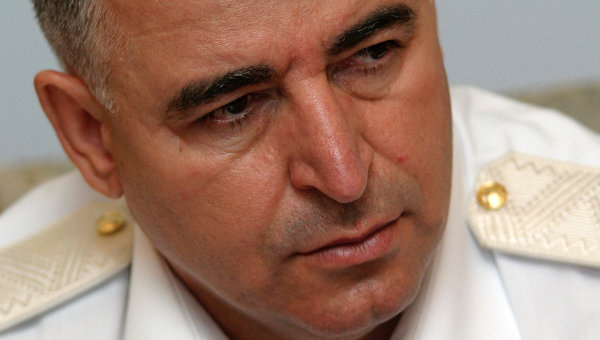
Chechen Officials Unable to Combat Growing Growth of Extremism and Separatism
Publication: Eurasia Daily Monitor Volume: 9 Issue: 84
By:

Recent events in and around Chechnya indicate a high level of tensions in the republic that also have become endemic in most parts of the North Caucasus. While being under Moscow’s control, Chechnya still is the main destabilizer of the region.
According to the Chechen Interior Ministry’s chief of staff, Magomed-Emin Jamaldaev, 15 insurgents were killed and 21 more were arrested in the republic in the first three months of 2012 (https://fwnews.ru/proisshestviya/s-nachala-goda-v-chechne-unichtozheno-13-boevikov). The law enforcement agencies also suffered substantial losses as 22 police officers were killed and 28 were injured in the same period of the year (https://chechnya.kavkaz-uzel.ru/articles/155726). If we compare these figures with the same period of 2011, when the law enforcement casualties consisted of only five people dead and 34 injured, it becomes apparent that the difference is hardly due to chance. Additionally, since the start of the year, 27 suspects were arrested in Chechnya for aiding the insurgency (https://chechnya.kavkaz-uzel.ru/). Most of the persons arrested were recent high school graduates or students.
Given these figures, preliminary conclusion can be drawn about the growing intensity of the fighting between the government forces and the insurgents. The Interior Minister of Chechnya, Ruslan Alkhanov contends that his ministry should ramp up efforts to fight terrorism, extremism and regular crime (www.stavropolye.tv/sfdnews/view/45056). Alkhanov made this statement when he addressed the local parliament. It is noteworthy that almost all large clashes with the rebels occurred in the eastern region of Chechnya that borders with Dagestan. This is the official control zone of Emir Hussein Gakaev and the informal leader of the insurgents, Aslanbek Vadalov. Clashes on April 23 near Gerzel village in Gudermes district of Chechnya that borders with Dagestan are one such example of his control. Two insurgents and two police officers, including a police colonel – the head of Gudermes’s crime investigation unit, Aslan Jamaldaev – and patrol police lieutenant Ahmad Adalaev were killed in action. The death of the boss of the crime investigation unit indicates that the clash was hardly accidental, as it was portrayed in the press (https://ria.ru/incidents/20120422/632096445.html).
Chechen insurgents informed through their news agencies that Emir Abu Khalid, who originally came from the Middle East and was Chechnya’s Qadi (Islamic judge), was captured by the Russians. Abu Khalid was one of the few remaining volunteers who was still alive and fought within the close circle of Doku Umarov (https://kavkazcenter.com/russ/content/2012/04/24/90181.shtml). Sources in the insurgency said that Abu Khalid was badly wounded and needed hospital care, but as he was trying to leave the country the Russians managed to intercept him. The insurgency’s media considered the Russian side’s silence about the incident strange. Most likely, the Russian officials will eventually announce that as a result of “a brilliantly conducted raid” they captured an Arab mercenary – just as it was in the case of the Ingush fighter Emir Magas (a.k.a. Yevloev-Taziev) when the Russian authorities withheld the information about his capture for over five months. About the same can be expected from Abu Khalid’s arrest, unless he dies while in captivity. This is the first unique case of an arrest of such a high-profile insurgent leader since Turpal-Ali Atgeriev was arrested in 2000. It must be noted that while being the Chechen insurgents’ Qadi, Abu Khalid was one of the key figures who resolved the conflict between the North Caucasian insurgents’ leader Doku Umarov and three influential Chechen commanders back in August 2010. The dispute at that time arose between Umarov and the three respective commanders: Hussein Gakaev, Aslanbek Vadalov and Tarhan Gaziev.
Not surprisingly the authorities in Grozny lashed out at the rebels. Ramzan Kadyrov led the assault, demanding from the Muslim clerics to step up their efforts to keep the insurgency’s ideology in check. “Special attention in the sermons should be paid to harmfulness and dangers of extremist ideology. People should be told of horrible woes that the Wahhabis brought with them” (www.grozny-inform.ru/main.mhtml?Part=8&PubID=33305). Kadyrov also demanded that his servicemen eliminate Hussein Gakaev and his associates. Police chiefs across the republic should consult town qadis once a month to identify people who may be direct rebel supporters or share their views and have conversations with them. The rebels’ parents also have to visit district police stations regularly and tell the police how they are trying to recover their sons from the insurgency’s ranks.
Ramzan Kadyrov fired his aide and the head of the government Center for Spiritual-Educational Development in Chechnya, Vakha Khashkhanov. Bai-Ali Tevsiev officially replaced Khashkhanov while the agency was upgraded to the status of a Department for Interaction with the Social and Religious Organizations, institutionally answering to Chechnya’s head and the Chechen governmental administration (https://grozny-inform.ru/main.mhtml?Part=8&PubID=33096). Previously, Tevsiev was an aide to Grozny’s mayor on spiritual-educational activities. In his turn, the former Qadi of the city of Argun, Magomed Khiytanaev, was appointed as the Grozny mayor’s aide and also retained the position of deputy to the head of the Spiritual board of Muslims of Chechnya (www.regions.ru/news/2404904/). The Chechen officials pay increasingly more attention to Islamic education, but in the Internet age their efforts to dominate this sphere are doomed. It is impossible to control what ideology is on people’s minds even if they profess something in the open.
The two ideologies are diametrically opposed to each other. It is evident that the supporters of Islamization and separatism in the region are becoming younger. Chechen youth increasingly are becoming interested in religious matters while the policies of Chechen officials often facilitate the spread of Islamic tradition in contemporary Chechen society. This is not only specific to Chechnya, but also to Dagestan and Ingushetia. Kabardino-Balkaria also has started to move in this direction. And this republic’s complete Islamization will automatically add the whole Northwestern Caucasus to this cohort of instability.
Since the start of 2012, the situation in Chechnya has evidently become aggravated. An indication of this trend is not only the greater numbers of the killed insurgents and government servicemen, but also the fact that high-ranking police officers died in the clashes. Ramzan Kadyrov’s reaction to the trend has been to increase his threats as he lashed out at the Muslim clerics for their “poor” efforts to combat Salafism and called for the elimination of rebel leader Gakaev along with all of his family members. In Chechnya, where extended families and clan structures are strong, family membership may span across dozens and even hundreds of people. Ironically, while fighting the Islamic teaching of Salafism, Kadyrov has already turned Chechnya into the most Islamic region in the Russian Federation, since he has been trying to use Islam as a tool to build his powerbase against his rivals. Kadyrov’s policy of Islamization in Chechnya is in turn leading to an overall increase in Islam’s role across the North Caucasus.




